
|
|
|
Scottish Schools' Chess in the 1970s
A Paisley Grammar School Perspective
Editorial
Introduction
Paisley Grammar School produced several
strong chess players in the 1960s and 1970s, in good part because of the
dedication and encouragement of one of their teachers,
Robert (Bert) Gray. The
school was one of several Scottish schools that registered successes in
team competitions and Jamborees.
A serendipitous meeting a few years ago between two former pupils of the school led to a reunion of all the members of a strong 1974 team. Further, though, the former pupils decided to raise funds for chess material for their old school.
This is an inspiring story of giving back to the chess community, as well as an acknowledgement of the hard work done by many chess organisers.
**********
by Douglas Mill
Back When We Were Fab
Yes, it's a George Harrison song, but the title sums up how dominant Scottish schools were in that era. Dundee High, Ayr Academy, Allan Glen’s and Paisley Grammar especially, but the general standard and number of schools playing at a fair level was impressive.
In this article I will look back, admittedly though a Paisley Grammar optic, but crediting other formerly superb chess schools.
So, who am I and where did this retrospective come from? I am not a well-known name in Scottish chess. In fact, my last competitive game was in London in 1975. My renewed interest arose out of a series of fortunate accidents which are worth relating.
I was Board 2 when PGS made the Sunday Times Finals in London in 1974. Three years later PGS made the last four again. A Scottish state school in a UK wide competition. When you are young you take such things for granted and it is only in the subsequent decades that you see the achievement in perspective. I am sure that a lot of people feel that way, in other sports too, and that they have missed a chance to say thanks and well done to those who helped them along the way.
And to quote The Proclaimers, 'You know our sense of timing we always wait too long'. So I will go on to pay tribute to all those such as Bert Gray at PGS, analyse the factors which produced this era and acknowledge the achievements of other Scottish schools.
What got me from 47 years of nothing more involved than chess problems and passively following the game to where I am today? I did maintain an interest, and am sad enough to have visited the hall where Fischer played Spassky in 1972, the Max Euwe Museum in Amsterdam, and watched Fabio Caruana play in the Isle of Man, but I was not an active player.
A series of Fortunate Events
First of all, a coincidental meeting on a farm road on Millport two summers ago. I had thought every now and then of seeing if I could get our Sunday Times team (McGregor, Mill, Provan, McAlpine, Stoddart and Kennedy) together again, but with Iain Provan in Canada, Arthur Stoddart in China, Gordon McAlpine in Findhorn and Alan Kennedy outside London, geography was against me.
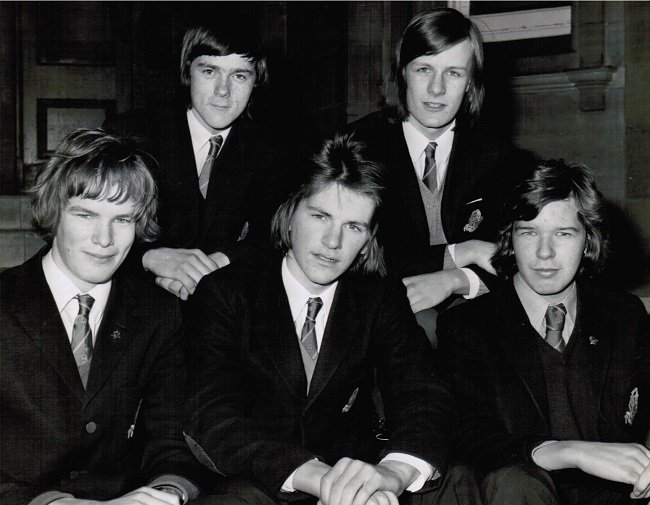
Paisley Grammar School
Sunday Times Team Competition 1974
Back, L-R: Douglas Mill, Iain Provan
Front, L-R: Douglas
McGregor, Arthur Stoddart, Gordon McAlpine
Alan Kennedy is missing.
Photo: Iain Provan
The chance meeting was with our internationalist Board 1, Douglas McGregor. He had retired from teaching maths and was spending more time at his holiday flat on the island. Covid had scuppered our foreign holiday plans, so Sheila and I arranged a few days on Cumbrae.
We recognised each other immediately and a long overdue curry was planned. Wheels were set in motion to get the team together. Arthur, now retired back to London, contacted Iain who had posted info on the Chess Scotland website, and we planned it for his return from Canada to visit his dad. Gordon and Alan were duly unearthed, and we met to have a pub lunch, get sentimental over beer, and recreate a photo taken on the steps of the school before we went to London.
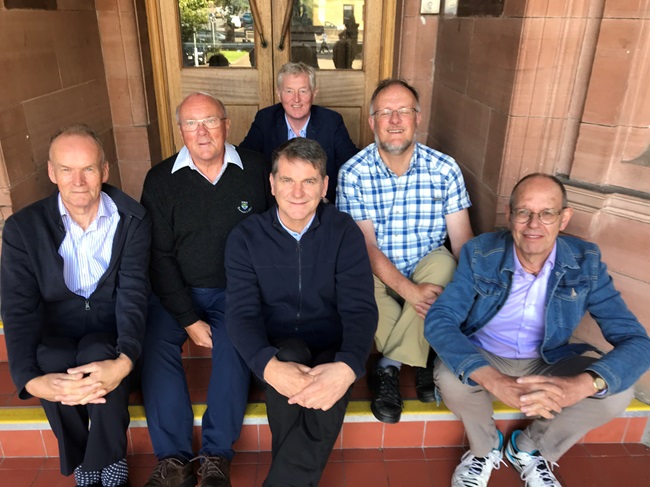
Back: The 'missing' Alan Kennedy
Middle, L-R: Douglas Mill,
Iain Provan
Front, L-R: Douglas McGregor, Arthur Stoddart, Gordon
McAlpine
Photo: Douglas Mill
And it all could have ended there, with arrangements to meet again in another 48 years, but coincidence number two kicked in.
Douglas was the only one of us who had kept his chess going. Understandable, because he was a level above us. For my part, going to study law at Glasgow in September 1975, I had to choose to continue my chess, or my debating, or my rugby. Chess and debating are very like law, so I chose rugby and have never regretted it. It provided exercise and a social life the others could not. I was lucky enough to have played in Ireland, Germany and Hong Kong. Would my chess have taken me there? Eh, no. But I always kept an interest and promised myself I would go back to it at some stage.
Coincidence struck again. Douglas still played for Paisley Chess Club, as did some of the other stars of my school era such as Buchanan, Moultrie and Muir. One of the stalwarts of that club is the unsung Alex McFarlane (retired maths teacher). Alex was a pupil at what was then another excellent Paisley chess school, John Neilson High. A real hero for chess in Scotland. And do not take my word for it. Here is what Jonathan Rowson said about him in his excellent 2019 book, ‘The Moves That Matter’.
'And in my mind, Alex McFarlane represents the kind of heroic volunteer who makes chess life possible and isn't thanked enough.'
And note what he says about Donald Holmes-another product of the Grammar chess factory.
'Donald Holmes taught me to love the experience of learning how to play chess better ─ nothing was more important to my chess development.'
Now Alex pinged me on an e-mail from Andy Cunningham, a maths teacher at Paisley Grammar. Why are they all maths teachers?
Andy had started up a chess club in the school. There had not been one for decades. He was looking for funding for equipment, which the Paisley club could not really afford. He had found material gathering dust in a cupboard when he started, including, amazingly, a clock of significance.
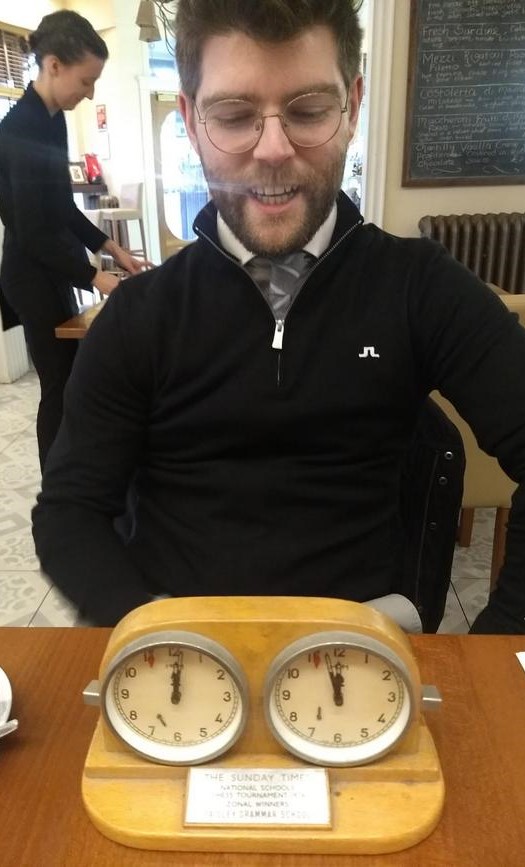
Andy Cunningham
The clock caption reads:
The Sunday Times
National Schools
Chess Tournament 1974
Zonal Winners
Paisley
Grammar School
Photo: Douglas Mill
I met with Andy (not a chess player himself, but a good enough golfer to make the latter stages of the Scottish Amateur) and without overpromising, said I would try to unearth a bunch of former PGS chess players and seek funds.
A Chance To Put Something Back. Great.
God bless social media. Based on the two Sunday Times teams and jungle drums, I started things off. We quickly got the £400 needed to get eight sets, boards and clocks, which were duly presented to the school by Douglas McGregor, Tom Craig and myself.
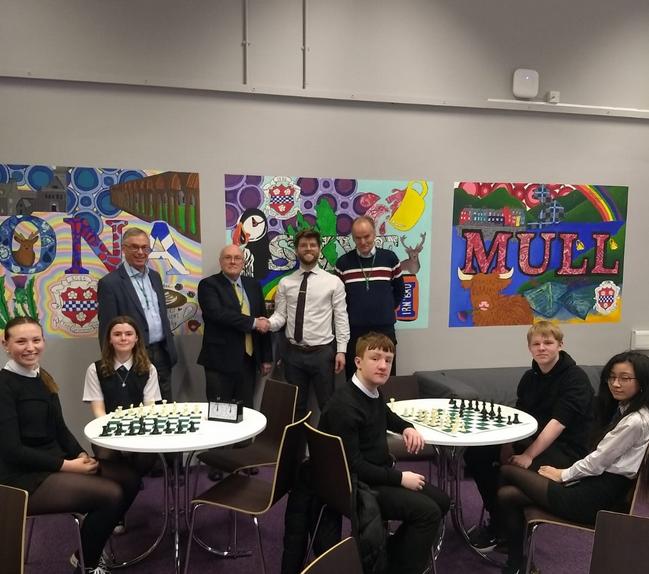
Surprisingly, and pleasingly, most of the pupils were girls, an outcome of the successful Queen’s Gambit tv series. It has influenced their generation the way Fischer v Spassky did ours.
I now have a fourteen-strong Patrons email list, home and abroad, a few of which I have not sought money from at this stage.
Setback and Recovery
Tragedy! Andy leaves Paisley Grammar School to teach at Bishopbriggs High School and we wonder if that is it for the new club. Solution; Andy's partner Jenna Collins, also a teacher at the school, steps into the breach. Yes, you've guessed it, she's maths!
Though slowly, development plans continue for a senior and junior school championship (for the Bert Gray Memorial Trophy) and with exploring matches against other schools. This is when you look back and realise how lucky we all were with The Sunday Times and The Scotsman schools' competitions, the 10-board Jamborees and, in Renfrewshire, the Anchor Cup. It was all on a plate for us.
Another Coincidence
As part of the Paisley Grammar Alumni Project, I teamed up with Derek Smith, a few years below me at school, and another Sunday Times player. My partner, Sheila lives in Bothwell and her parents in Bishopton. Sheila brought to my attention that school chess tournaments were held during the festival weeks in both Bishopton and Bothwell.
I went along to Bishopton expecting two men and a dog. Not so; 50-60 kids and dozens of parents. The enthusiasm was amazing. In charge was Andy McQueen, to whom I introduced myself. Yes, he said, you are Derek’s pal. A few weeks later showed similar levels of interest in Bothwell, and who was running it? Yup, the unsung Andy McQueen. A retired techy, he coaches extensively in a dozen Renfrewshire area primary schools. The fact that I bumped into Andy at a St Mirren match the following week made it almost spooky.
The importance of this connection is that it opens up coaching possibilities at secondary level and proves that while the opportunities are there at primary stage, organised chess seems to fall off a cliff once the kids go into senior school.
Back to the Website
I had my attention drawn to the Chess Scotland website and contacted Alan McGowan, the CS historian. In our discussions, Alan agreed that the ‘70’s were indeed a golden era and the idea developed for this article using the primary sources I had to hand. Alan was able to put me in touch with Iain Sinclair, Grammar’s first outstanding chess player. Iain and I exchanged emails and had a Zoom meeting, and he added to my recollections of the era and aided my analysis
One thing which particularly impressed me on the website was the tremendous history of Allan Glen’s chess. A great school no longer with us. I have fond memories of matches there-including, believe it or not, playing for Renfrewshire School v Glasgow Schools over about 30 boards. Yes, back then things like that did happen, thanks to the stalwarts we all then took for granted. That must have taken some organising.
The Paisley Grammar Story
Inspired by the reunion and the Chess Scotland website I started thinking about what the factors in the school’s chess success might have been:-.
They were:-
1. a
charismatic teacher
2. an outstanding international standard player
3. a local chess club
1. Our Charismatic Teacher
Bert Gray is factor number one in the Paisley Grammar School story. He is not unknown to this website, a glowing tribute having been paid to him by Iain Sinclair, his protégé. Chess News, an old foolscap wet-print publication, was entirely down to him.
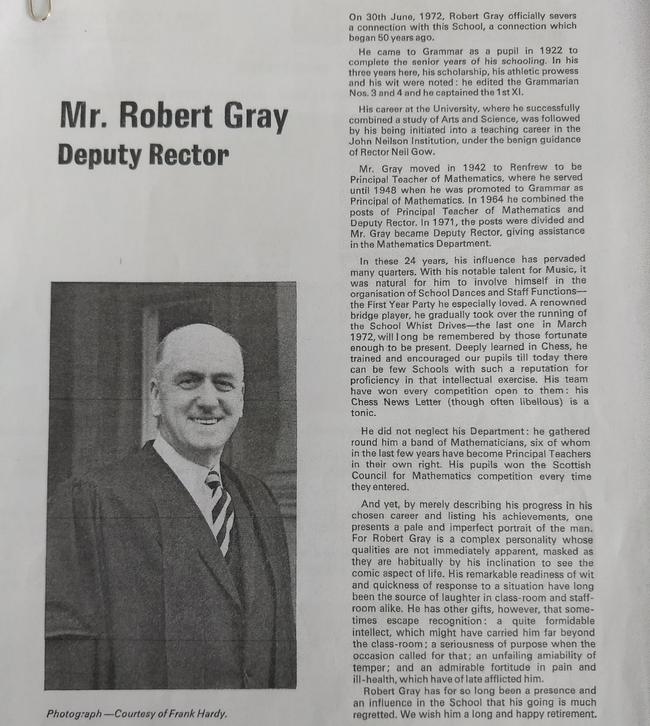
To say Bert was ‘old school’ is a tribute of the highest regard. I am not sure when he started chess at PGS, but the first Chess News I have is No 4, Christmas 1968 when I was in Primary 7. I have a pretty intact set (and other materials such as Jamboree information) up to what I think was the last, No 32 in June 1973. They are an absolute treasure trove of schools' chess history ─ and not just about Grammar. Dozens of schools get a mention.
He was a hugely talented and loved domine replete with idiosyncrasies, such as wearing his carpet slippers and a Johnstone Burgh junior ootball scarf about the school.
He simply created a culture. He made chess mainstream in the school. I remember he concentrated on the Primary School and arranged an annual grudge match with the First Years. As you will see from the above, he had 92 people playing in that!
And that is part of this analysis. The Sunday Times confirmed the quality of Scottish schools chess, but that outcome came from quantity, the number of pupils playing. The report of the Scottish Boys' Championship in 1972 guesses at 4,000. It may have been more as Grammar were not alone in the popularity stakes. As Iain Sinclair says,
‘To get the attention of kids you need initially to introduce them to the game. The fascination of chess will take them on a bit from there, but to keep their attention you need to create an environment in which they can improve their standard of play. The best way to do this is to play as much as possible against players who are stronger than yourself. Also, to read as much chess literature as you can. A further way to keep their interest is to make them feel part of something─a team, a club, a chess community.’
And that is what Gray did in Room A4 and with Chess News. Gently, persuasively, kindly.
2. Our Role Model
On reflection, it was the arrival at the school in 1965 of Iain Sinclair which was the catalyst Gray required to consolidate PGS chess and move it on to a higher level beyond local county competition. Not that that was weak, as the John Neilson team of McFarlane, Galbraith, Duncan et al (although in a higher age grouping) were probably stronger at that time, and other schools with less depth had the odd outstanding player, such as Graham Paterson of Camphill in Iain’s time and Brian Miller of Johnstone High in mine.
Before that, inter school
competition was patchy. I spoke to now – retired Ayrshire surgeon and
Troon Chess Club stalwart, Clive Baird who was 3/4 years ahead of
Sinclair. He echoed his comments “ It was all down to Bert Gray. His
influence and enthusiasm were tremendous.” Whilst there were other strong
Grammar players in his time such as Ernie Gibson, John Donaldson and Andy
Matthews, Baird’s era lacked further strength and depth, and more
critically the structure of competition against other schools who
themselves had the odd outstanding player such as Jim Montgomery from the
Neilston, Cliff Mays from Camphill and Russell Spence.
In preparing this article I was made aware by Alan McGowan of a little known precedent of Paisley school chess excellence. This was as far back as 1927 in Mossvale School- then what we called a junior secondary and now a primary school.
Clearly the inspirational Mrs Brockett was the Bert Gray of her era.
Gray had his role model. Sinclair, Scottish Boys champion in 1969, was our chess wannabe. Always a nailed-on win on Board 1, Iain was good enough, at the age of fifteen, to draw with Yugoslavian Grand Master Svetozar Gligoric the following year. Needless to say, the game was reported by Bert, with pride, in Chess News. A Grammar boy crossing swords with a renowned Grandmaster! No wonder we were all proud.

Iain Sinclair in 1970, when a member of Scotland's Glorney Cup team.
Gligoric─Iain Sinclair
Glasgow (simul) 15 January 1970
1. d4 d5 2. c4 e6 3. Nc3 Nf6 4. Nf3 Be7 5. Bg5
Nbd7 6. Rc1 c6 7. e3 h6 8. Bh4
O-O 9. Bd3 dxc4 10.
Bxc4 Nb6 11. Bd3 Nbd5 12. O-O Nxc3 13. bxc3 c5 14. Qe2 Bd7
15. Ne5 Rc8 16. Rfd1 cxd4 17. cxd4 Ba4 18. Rf1 Nd5 19. Bxe7 Qxe7 20. Qb2
Qb4
21. Qxb4 Nxb4 22. Bb1 Rfd8 23. f3 Nd5 24. Kf2
Nc3 25. Rfe1 b6 26. a3 Nxb1 27.
Rxb1 Rc3 28. Ra1
Rdc8 29. Re2 Rb3 30. Rd2 Rcc3 31. e4 Rxa3 32. Rxa3 Rxa3 33. d5
exd5 34. exd5 f6 35. Nc4 Rc3 36. Ne3 Bd7 37. d6 Kf7 38. Nd5 Rc5 39. Nc7 a5
40.
f4 Rc6 41. g4 a4 42. f5 a3 43. Nb5 Ke8 44.
Nxa3 Rc3 45. Nc2 Ba4 46. Nd4 Kd7 47.
Ne6 Rc2 48.
Nf8+ Kd8 49. Rxc2 Bxc2 50. Ke3 b5 51. Kd4 b4 52. Ne6+ Kd7 53. Nxg7
Kxd6 54. Ne8+ Ke7 55. Nc7 b3 56. Nd5+ Kd6 57. Ne3 Kc6 58. Kc3 Kd6 59. Kd4
Kc6
60. Kc3 Kd6 61. Nxc2 bxc2 62. Kxc2 Ke5 63. Kd3
h5 64. gxh5 Kxf5 1/2-1/2
(Source: Iain Sinclair)
I have a particular memory of Iain playing for Scotland v Switzerland in a schools international played by telephone at the Robertsons Jam factory in Paisley, a team which included three of the Ayr Academy stars-Penman, Findlay and Bentley.
From the Scotland v Switzerland telephone match, 12 November 1972:
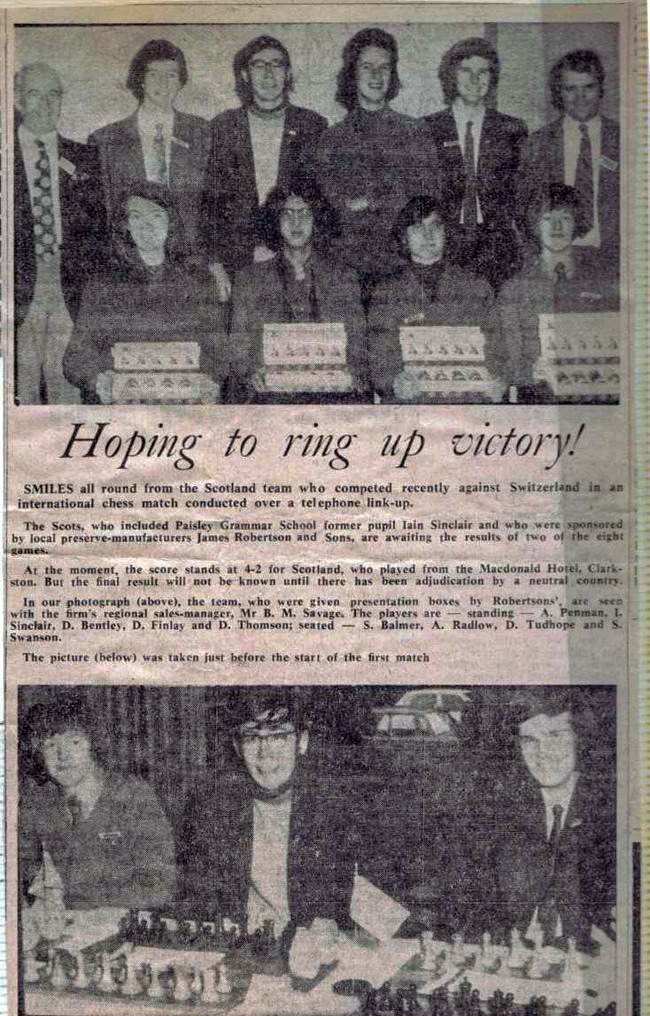
Paisley Daily Express, 20 November 1972
3. Our Local Chess Club
Another reason for the strength of not just Paisley but Renfrewshire school chess was the Anchor Club, a product of Clark’s Mill in the east end of the town. Once that closed it evolved into Paisley Chess Club and went to Ciba Geigy, the YMCA and now plays at a very high level in a local bowling club.
Paisley is like a Bruce Springsteen song; listen to 'My Home Town'. The local textile mills which had dominated world production were in sharp decline, but in their heyday provided recreation over a range of sports for, principally, their workers. Few of us did not have a granny who had been a mill girl. I had two. One of the residuals was the chess club.
It had several teams in the Glasgow league and was run by people like Eric Graham, Ian and Robert Gailey, and others you simply took for granted. Grammar was half a mile away and whilst boys from other local schools went along, PGS benefitted most from this vibrant and welcoming local institution.
It ran individual and team school competitions and, without anything formal, coached youngsters. I remember going along Seedhill Road one evening each week and filling in where there was a vacancy in a home team. Playing for Anchor C against grown-ups such as the General Sikorski Club, you grew up fast. This symbiotic relationship benefitted both the schools by coaching and polishing the pupils, and the club itself, by ensuring a steady flow of young members.
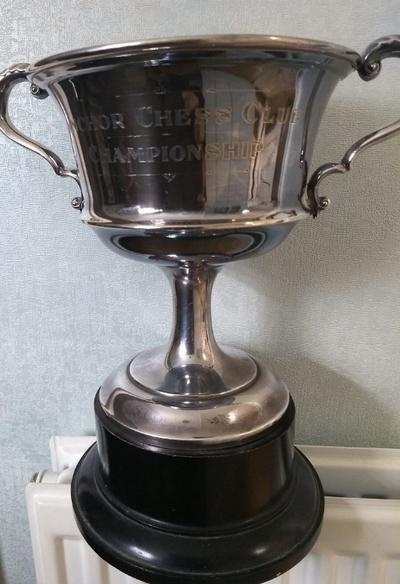
Anchor Chess Club Championship Trophy
Iain Sinclair has particularly fond memories of his time there:
‘I think in the 1970’s Scotland enjoyed a great combination of factors ─ great chess-oriented teachers such as Bert, and well-organised clubs which welcomed school kids such as Anchor and Cathcart. Joe Kozler, an Anchor stalwart, used to come in early on club nights and leave a few of his old Chess magazines lying about for the kids. That was wonderful, because back then, few school children could afford to buy them.’
And he too, in retrospect, appreciates the time put in by unsung heroes such as Walter Munn, Gerald Bonner, Alan Shaw, Ken Stewart and, most of all, John Glendinning.
Locally also, Johnstone Chess Club, run by the unsung Robin Craig, helped develop Colin Sutherland, Alastair Mathie, Peter Warwick (who won the Glasgow Under 16) and David Bone.
Other strong players were about in this era at the Grammar, such as McDonald, Beattie, Madden and Stark, but PGS did not ever quite have the strength in depth to make an impression nationally. Ultimately, the cultivation of that saw Grammar dominate Scottish Schools chess from 1973 for a decade.
The above three aspects ─ a charismatic teacher, an outstanding player, and a local club ─ intermingled to create a culture which lasted almost 20 years.
At my disposal, as primary material, I had:-
(a) my Chess Sutton Coldfield scorebooks; who remembers them?
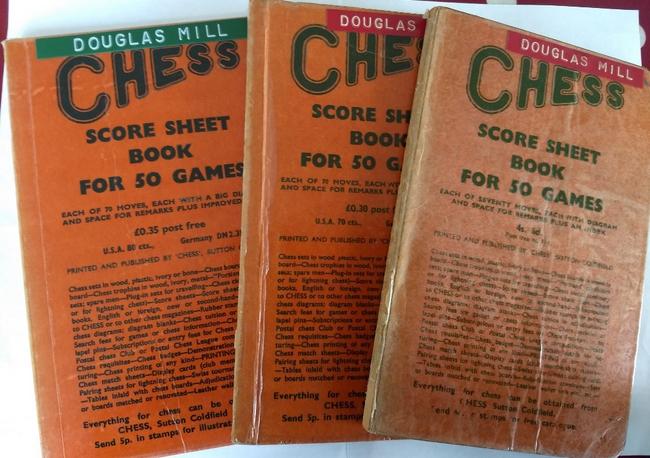
(b) annual club reports included (uniquely amongst schools?) in the school magazine; and
(c) a hundred-odd pages of Chess News, a bulletin produced at the school. You will note that we were still in the era of descriptive notation.
There follows a few extracts from Chess News:-
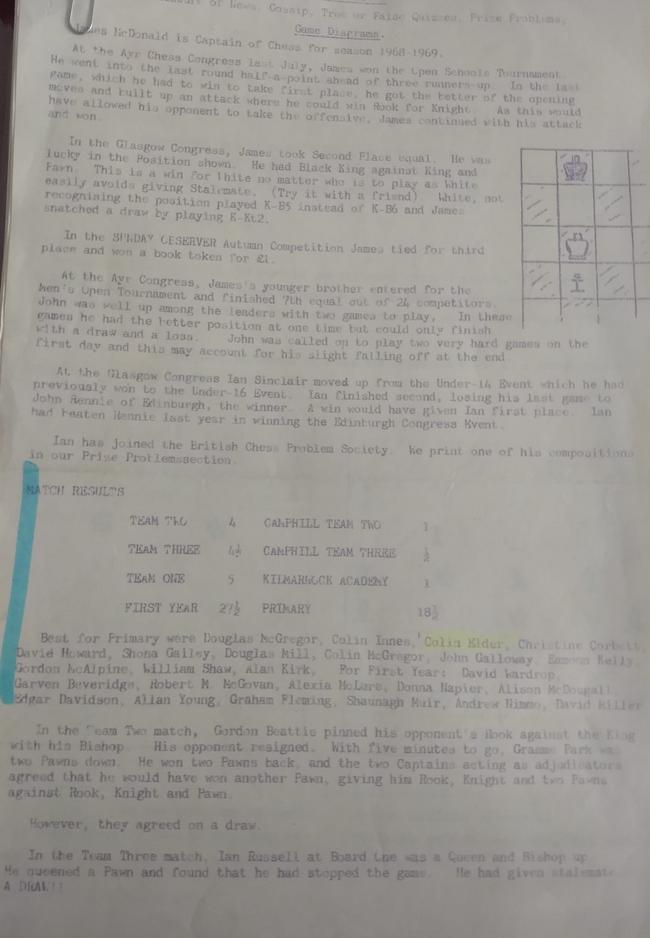
1968-69 Season
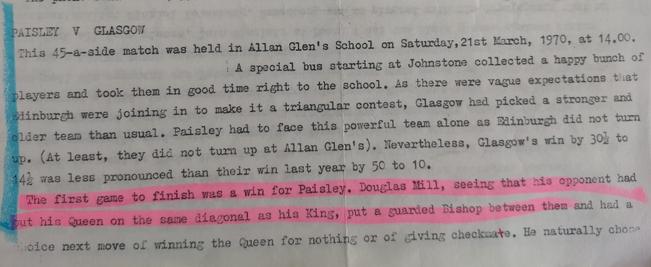
45-board Paisley v Glasgow match 1970
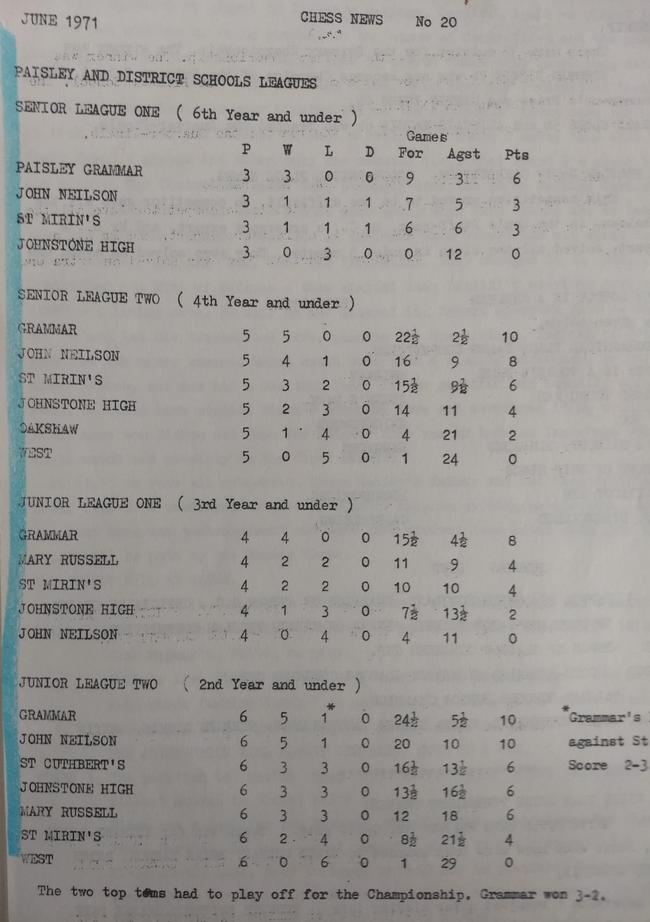
1971: PGS dominates the Schools' League
Team Tournaments
The Sunday Times National tournament was the true test of Scottish chess in the UK. It was for me the pinnacle, but there was a myriad of other tournaments when I was younger: 10-board Jamborees; The Scotsman event over four boards; Renfrewshire Leagues. And even, believe it or not, the Scottish Schools Postal Chess Championship! Try explaining that to a 10-year-old.
Our confidence grew as Grammar dominated the Jamborees, winning so regularly that our B team was often second. The ultimate legacy of Bert Gray? The sheer number of people in the school he got playing.
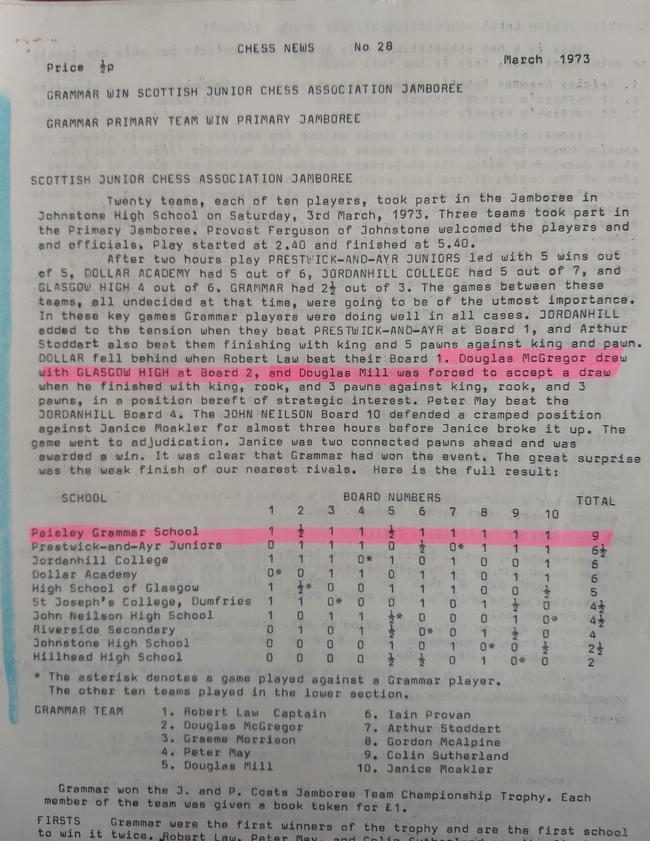
PGS dominates the 1973 Jamboree
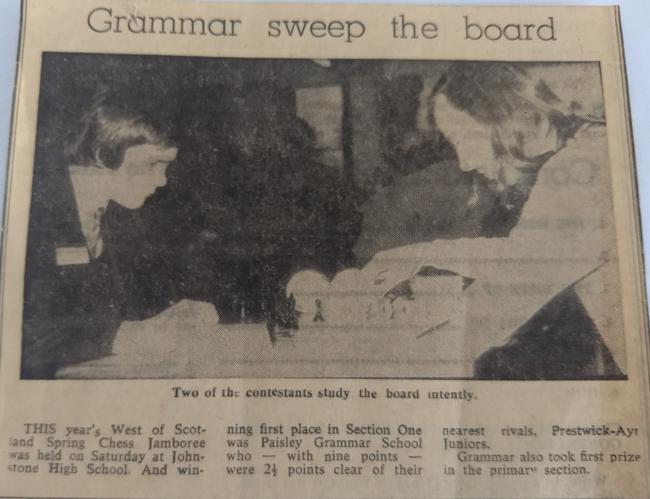
A scene from the 1973 Jamboree
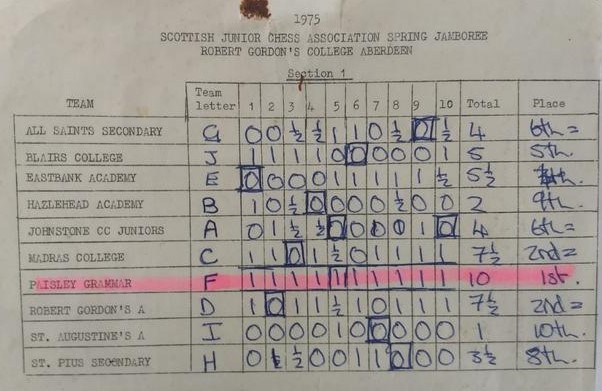
PGS dominates the 1975 Jamboree
Sunday Times National Tournament
So, the Sunday Times was the culmination of four or five years of cutting our chess teeth.
Allan Glen’s, with Buchanan, Moultrie and Thompson, generally beat us in the Scotsman, but when it came to the six-board Sunday Times we had boys playing at 3, 4 and 5 who, if they had been at other schools, would have been their Board 1.
I was lucky to have been in a year group with a lot of strong players. The year above us? None, except the excellent Janice Moakler. And that was important as the prestigious, all-UK Sunday Times competition took age handicapping into consideration. The older your team the more you had to win by. The age group two years above us were strong with Law, Morrison, May, Balfour and Sutherland, but we eventually edged them and by fifth year were in good shape for the Sunday Times.
We had a win over Clydebank High School in round one but the tipping point for us was in December 1973, when we beat former holders, Ayr Academy, 3½-2½. Strangely, my score book says ‘Marathon match. No clocks. Over four hrs.’ Unusual for a Sunday Times game. Psychologically this was significant. At last Grammar had strength over six boards.
We went on to beat Keil School, Glasgow High and Dumfries Academy to set up a Scottish Final away at Dundee High. Now, that is six rounds which means about 64 schools in Scotland were strong enough to play in the UKs top competition. Incredible.
Our 5½-½ trouncing of DHS included a career first for me as I had the very strange experience of watching my opponent’s flag fall. I had never won an important game on time before.
We were now in the uncharted waters of facing English and Northern Irish schools.
An easy win over Hylton Red House and a tight telephone match with Methodist College Belfast saw us on our way to the St Ermin’s Hotel in London.
In the semifinal we were edged out 3½-2½ by Southern Grammar Portsmouth, who had English internationalists at Boards 1 and 2. Reality check. The next day, we lost third place to King Edward VI of Birmingham. Disappointing, but a couple of damn close-run things, and it gave us confidence that next year we could go further.
Ian Provan was the only one of us not going back for a sixth year and by now our wonderkid, David Walker was making his mark. In fact, and entirely on merit, he displaced me on Board 2. So, in 74/75 we were not just experienced, but actually a stronger team.
In the early rounds, we beat Keil School, Allan Glen’s, Glasgow High and George Heriot’s to reach the Scottish final in Aberdeen against Robert Gordon’s College, whom we beat 4-2.
We were then on our travels to Prior Pursglove College, Guisborough in April, and Bolton School on 20th May…and no, Nigel Short went there but was far too young to have played. Both were 4½-1½ wins and, candidly, they were poorer than some of the Scottish teams we had faced.
En passant, as I understand real chess players say, all these trips were by train, and none of us ever recollect teachers being with us. These days? A risk management assessment would rule that out. Another nail in the resilience coffin.
We were drawn at home to play St Paul’s School, London in the quarters. One win away from another trip to St Ermin’s Hotel. But then things went wrong. Scottish schools stop at the end of June. We were to have played in the first two weeks of June, but St Paul’s managed to get a postponement until 11 July, on the basis that June is A-level exam time down south. Fair enough and I do not think there was anything devious about it-they probably did not know about the different holiday times.
The effect on us was drastic. We had all left school three weeks before and had the artificial task of putting on our uniform again and trying to concentrate on a vital match. Technically, I don’t think Douglas McGregor and I were even schoolboys any longer, and by then Gordon McAlpine was in Denmark and Arthur Stoddart in Kenya. The engine room of boards 4 and 5 where we always punched above our weight had gone.
I ground out a draw, and the two younger players we brought in did well (and it stood them in good stead for a couple of years later), but the London team were worth their 4½-1½ win. They went on to win that year, so good luck to them, but we were left wondering what could have happened in June with a full-strength team.
Douglas and I were history, but the torch had been passed on and three years later Grammar went one better by taking third place in the Sunday Times finals in London.
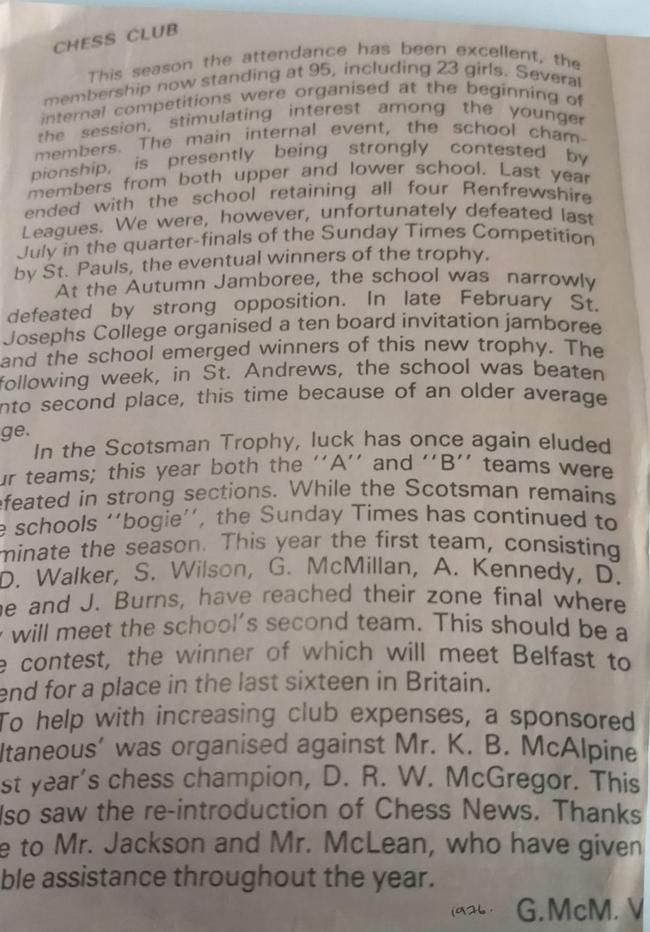
1976 Report
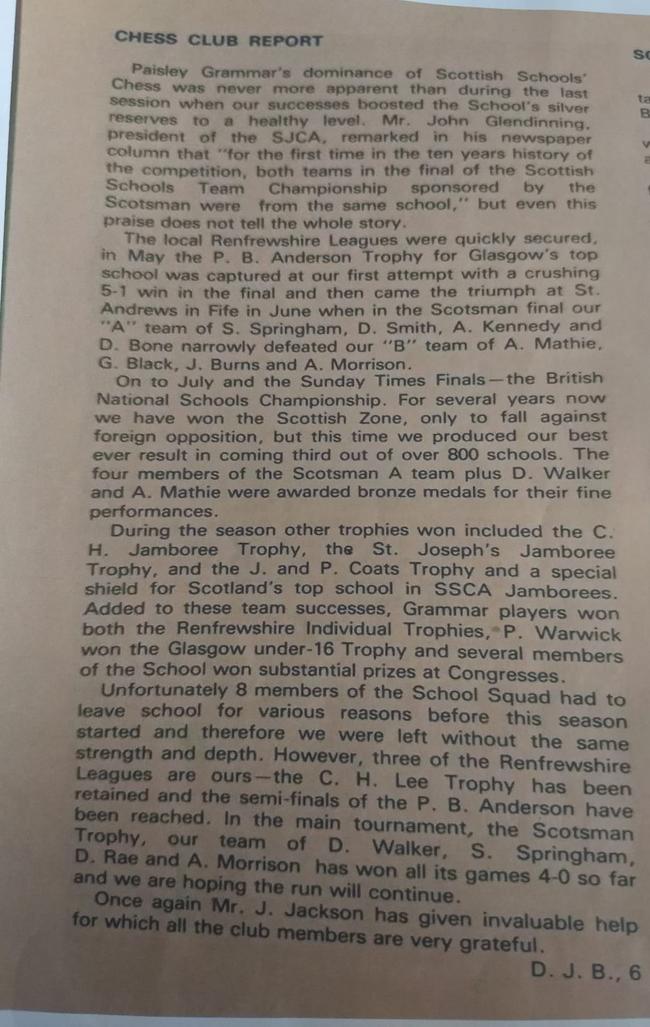
1977 Report
There are several things worth highlighting in these two annual reports in the school magazine. The first is in Gordon McMillan’s 1976 Report and the fact that the club that year had 92 members of which 23 were girls. A remarkable increase in gender balance.
Secondly, note the curse of eventual winners St Paul’s struck again in the quarter finals!
Thirdly, after Bert, teachers such as Mr Pedley, and more particularly John Jackson (pictured below), and Bob McLean kept up the support and interest. We are indebted to them.
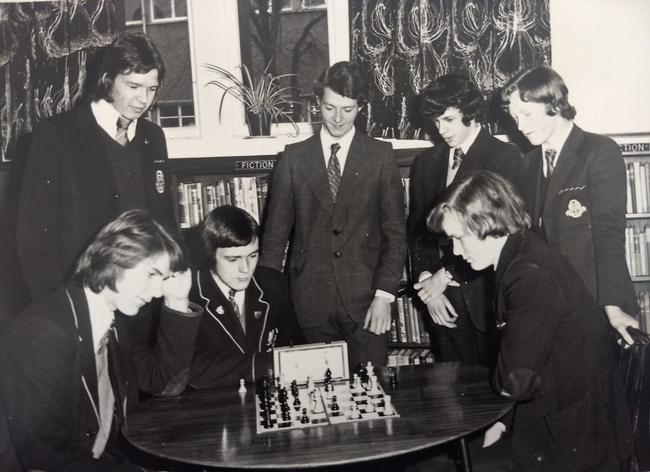
Teacher John Jackson and pupils
David Bone’s 1977 report records the pinnacle of PGS dominance with a plethora of team and individual wins. As John Glendinning noted, two teams from the same school contesting the Scotsman Final was remarkable.
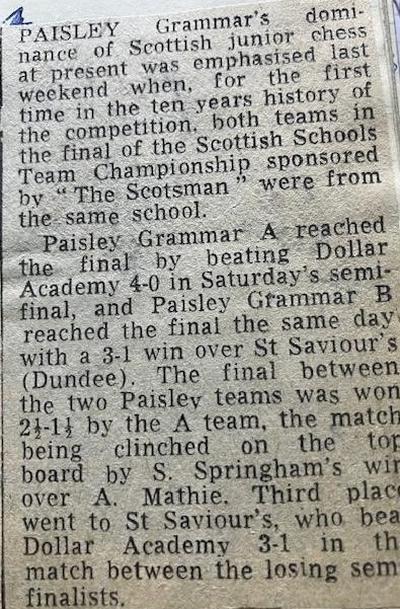
From John Glendinning's newspaper column
Grammar, represented by Walker, Springham, Smith, Kennedy, Bone and Mathie, went one better in the Sunday Times, taking third place. After beating Dumfries Academy, George Watson’s, St Patrick’s Dumbarton and Perth High with an aggregate score of 20½ to 3½, they were Scottish Champions again. (Almost more impressively, the B Team made it through four rounds to the Scottish Semis.)
Victories over Royal Grammar School Newcastle by 4½-1½, Hymer’s College Hull by 4-2 and Watford Grammar School by 4½-1½, saw them back in London for the last four.
Glyn Grammar edged them out 4-2 in the semi, but a board count win over Bristol Grammar bettered the 1974 result, which was also 3-3, but a board count loss.
Although the trophy had eluded them, Grammar had contested an incredible two semi-finals and two quarter-finals over a four-year period.
And until the ending of extra-curricular activity in state schools, this self-generating culture continued. The Bert Gray seeds in the late 60’s kept flowering for almost 20 years, but as we approached the 1980’s, the strength in depth was running out. Though by then, Grammar had produced probably its strongest player of all, FIDE Master Donald Holmes.
Again, en passant, I would back an All-Time PGS Sunday Times team of Holmes, Sinclair, McGregor, Walker and Law (Board 6 is hotly contested by Gordon Beattie, and a host of others) to give the finest of Allan Glen’s and Ayr Academy a good run for their money.
Those Days Are Past Now
But can we still rise now? Is there any chance of a return to Scottish School chess greatness?
Sadly, probably not. And for a host of cultural reasons.
Firstly, except for Dundee High School, the great schools of the 70’s were state schools. This makes the achievements in that era even more creditable. Several have been closed. The loss of Allan Glen’s excellence-in chess, but in other fields too ─ I remember many a tough rugby encounter with them ─ was almost an act of educational vandalism. Locally, the outstanding John Neilson High was closed in the 1980s. So, some of the formerly great state schools simply are no longer. Heritage and culture have gone. When we played against Glasgow Academy, Glasgow High, Hutcheson’s, Kelvinside Academy, St Aloysius, and George Heriot’s, it was with no sense of inferiority. They were all victories.
Similarly, when I played for the Glasgow Schools rugby team in 1975, our players came from Greenock Academy, Kilmarnock Academy, Lenzie Academy, Ayr Academy, Prestwick Academy and Marr College. These days I doubt if there are any state school players given this opportunity. En passant for the third time, I could never quite persuade my rugby chums that I was always more exhausted after a tight 3½-hour Sunday Times encounter than a game of rugby.
Secondly, the culture has gone. Whether it was the teacher strikes, general declining standards in Scottish education or something more deliberate, can be debated till the cows come home and here is not the place. Suffice to say, looked at through the optic of chess, the mix of factors identified by Sinclair are almost entirely missing.
Thirdly, we were the Baby Boomers. There were simply thousands of us. Paisley, for example, has dropped from eleven secondary schools in 1974 to four. The raw numbers are no longer there.
I had thirteen happy years at Paisley Grammar. It was a co-educational, meritocratic county school which provided a myriad of extracurricular activities. Ask me what I enjoyed most, and the answer is the rugby, the debating and the chess, not O-grade Latin, Higher History or 6th Year Studies English. Pupils do not get these opportunities any longer. Teachers are not expected to involve themselves in work after 4pm and outsiders are put off by oppressive regulation.
I think chess is important. More than any of my academic subjects, it prepared me with the mental hardness I required in my career. I know with computers people play chess in different ways, but the physicality of the game─the handshake, the ticking of the clock and sound of the pieces on the board ─ were all part of the magic.
Schools are the perfect setting for team-based chess. These days with so much concentration on the individual, a generation has grown up without the camaraderie and dynamic of the Sunday Times team. These experiences test you and forge lifelong friendships.
With that in mind, and for a time, when at the Law Society of Scotland, I instituted a schools tournament and for a couple of years it was a success. Sadly, after my departure it withered on the vine.
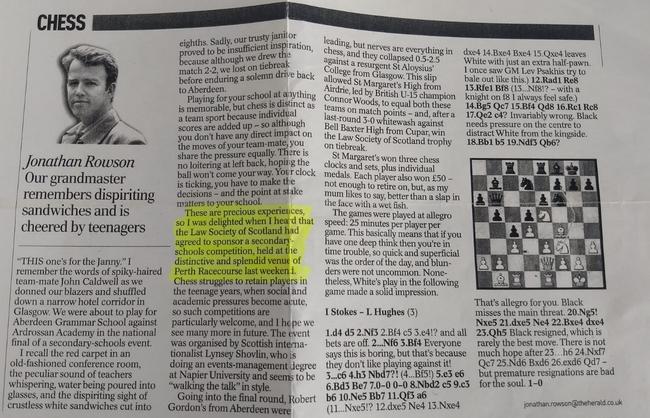
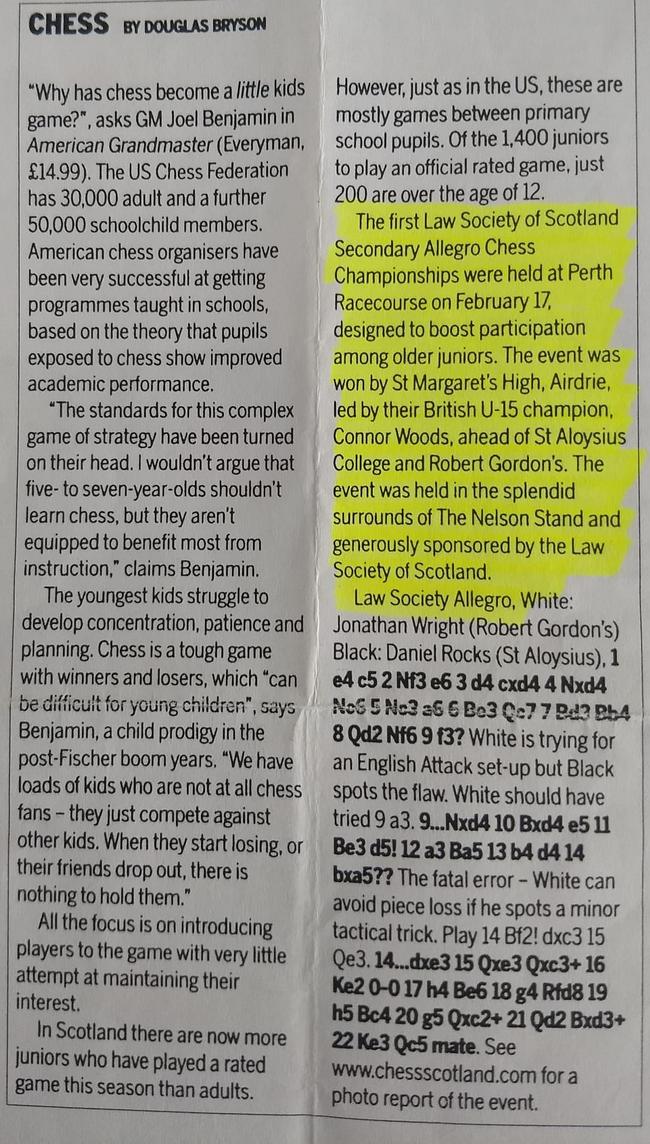
The chess I played then has changed out of all recognition. From paper and wood to computers. Obsession with gradings and openings. A generation of excellent players who never leave their own bedrooms. Better? Worse? Who am I to say?
I hope this has been of interest. I hope it may inspire some of you to attempt a reunion and document your own school experiences. I hope those of you I failed to mention ─ there will be dozens ─ are not offended. If you are, feel free to complain to
drm@douglasmillconsulting.co.uk
Lastly, can I thank Iain Sinclair, Clive Baird, David Bone, Derek Smith and Arthur Stoddart for all their help with this article.
As Bert would sign off…
Yours in
Chess
Douglas Mill
Alan McGowan
Historian, Chess Scotland
added 14/9/2024